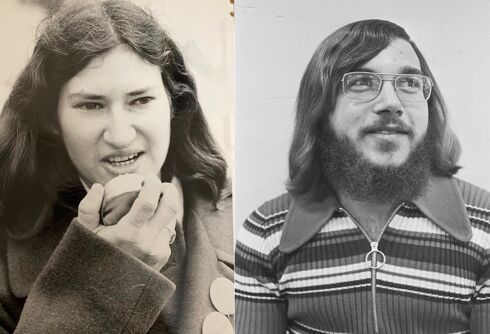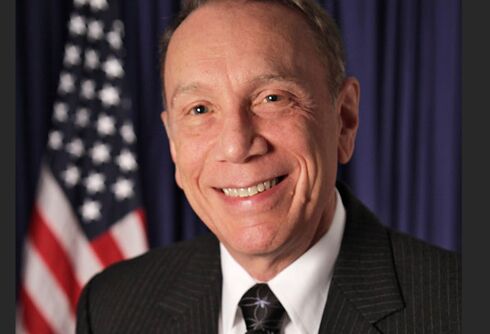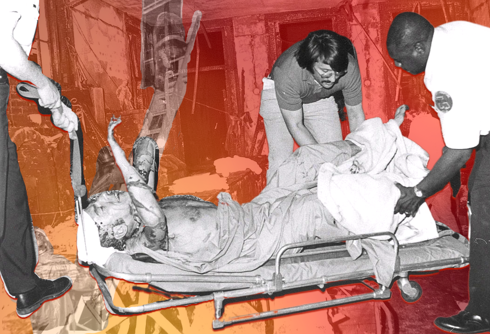I never knew I had missed out on LGBTQ+ education back at school due to Section 28 – a British law enacted in 1988 by conservatives under then-Prime Minister Margaret Thatcher. Section 28 prohibited the “promotion of homosexuality” in local authorities, including schools. In 2003, one year after I graduated high school, it was repealed by a Labour government. Now, at 37 years of age, I still feel the impact of Section 28.
Ironically, it was only when I gave a speech at a school in 2005 that I realized how significantly Section 28 had impacted me. I remember that day well: I was in London, and it was only a short time after the London bombings. I had four youth workers with me from the LGBTQ+ youth project with which I was volunteering. Because this hadn’t been done before. I, a 19-year-old gay guy, was speaking to a small army of students at their school assembly about what it was like to be gay.
Related:
Trans is not a trend: 4 gender-nonconforming historical figures who dared to be themselves
The figures spotlighted here are only a drop in the ocean.
They were stunned into silence. I could smell the volatility in the air but also the sense of hope that LGBTQ+ education was coming into the forefront now that Section 28 was finally gone.
Dive deeper every day
Join our newsletter for thought-provoking commentary that goes beyond the surface of LGBTQ+ issues
Despite being familiar with the word “gay” for most of my school years, it wasn’t until I was sixteen that I finally realized it meant fancying boys. Up until then, my understanding of its meaning contrasted with the many degrading and unsavory words that we weren’t allowed to utter under our breath at school, let alone say out loud.
If we were heard cursing, we were given a ticking off by a teacher, and repeat misdemeanors would’ve warranted detention. Yet when anyone used the word “gay” – for example, “my pen is gay” when it wasn’t working properly – it was never challenged. In fact, it was commonplace. It wasn’t just faulty pens that were gay, but anything that was less than acceptable. I was also often referred to as gay, thinking it meant “rubbish” or “uncool.” What I learned was it was the very last thing anyone wanted to be.
I was a target for bullying at school due to being “different” in every way. My mother didn’t cut my hair very often, so I had a mullet-like hairstyle, which was a total no-no at the time.
“Your hair is gay,” the bullies would taunt me. At the start of year eight, when I was twelve, my voice broke before all the other boys. “You sound gay,” someone would remark after I replied, “Yes miss” at registration, instantly triggering a chorus of giggles. Everything I said, did and even how I looked was gay, irrespective of whether I was actually gay or not.
When everyone’s hormones kicked in during year nine, the bullying became more aggressive. In the space of twelve months, I’d been punched in a schoolyard, resulting in severe injuries, had chewing gum rubbed into my hair, had dictionaries thrown at me, and was tripped over many times. One bully even brought a BB gun to school and threatened to “shoot” me. There was no denying the relentless bullying I endured would take its toll on me eventually.
Having no other option but to run out of lessons or avoid them entirely, my sanctuary became the boys’ toilets. It was the only place I knew I wouldn’t be found. Locked inside a cubicle, I would binge-eat the contents of my lunch box. Feeling nauseous, my instinct was to stick my fingers down my throat and heave. To my relief, it felt like I was flushing the tension and anxiety built up throughout the school day, down the toilet – literally.
Back then, in the year 2000, when I was a mere thirteen years old, I was unaware my bulimia even had a name. As far as I was concerned, it was something I had invented and I certainly wasn’t aware it was a serious and potentially life-threatening eating disorder. One day, I was caught in the act amidst a binge by a teacher in the toilet. “Get back to class now!” he yelled. My safe space had been violated and my secret coping mechanism almost exposed. Instead of going back to class, I decided to do the ultimate rebellious act of walking out of school entirely.
My mother kept me off from school for several days. She marched me down to the school at 8:30 am armed with letters that basically said, “Sam isn’t going in until the teachers put a stop to the bullying.”
The school’s response was that they’d take legal action if I didn’t return the following day. In the end, I wrote a list of names of thirty or so bullies and their offenses, which were mostly homophobic name-calling and violent attacks. My head of year spoke to every one of the bullies and gave them a warning. But while the bullying was less intense for a short while, it didn’t last.
At the time I didn’t realize homophobia was the “elephant in the room” that my teachers were unable to do anything about. Because Section 28 had paralyzed their ability to address the bullying at its core. My teachers literally had their hands tied. They feared the repercussions.
In 1987, a year after I was born, Margaret Thatcher said in an infamous speech: “Children who need to be taught to respect moral values are being taught that they have an inalienable right to be gay. All of those children are being cheated out of a sound start in life!”
Needless to say, over twenty years since I left school around the time Section 28 was abolished, its legacy still lives on inside me. Only when I completed trauma therapy last year, after many dark years of battling bulimia and alcohol addiction, three psychiatric hospital admissions, several emergency room and failed suicide attempts, did I conclude it was I who was cheated of the chance for a stable and sound life where I could be myself.
Fortunately, now in recovery from the addictions and mental health issues, including Complex PTSD, that began with my homophobic experiences at school, I no longer blame the bullies, my teachers or even my mother who tried her best. If the torment of Section 28 taught me anything, it was the survival skills I needed to overcome it.
Looking over to the other side of the pond, it horrifies me to see the expansion of the Don’t Say Gay bill in Florida and beyond. This is today’s version of Section 28. It’s a reminder that LGBTQ+ equality is progressing and regressing simultaneously. At a time when the rights we have fought for are unraveling at the seams, it makes me realize that it’s not history that repeats itself – it’s people who repeat history.
Thankfully, LGBTQ+ activists were successful in getting Section 28 abolished after many years of tireless campaigning. I hope that by learning lessons from the past, the same can be achieved in dismantling the awful Don’t Say Gay bill sooner rather than later.
If you or someone you know is struggling or in crisis, help is available. Call or text 988 or chat at 988lifeline.org. The Trans Lifeline (1-877-565-8860) is staffed by trans people and will not contact law enforcement. The Trevor Project provides a safe, judgement-free place to talk for youth via chat, text (678-678), or phone (1-866-488-7386). Help is available at all three resources in English and Spanish.
Sam Thomas is a writer, campaigner and public speaker. He is working on a fictional book series for LGBTQ+ youth on sex positivity codenamed ‘The 1989 Project.’ Find him on Twitter and Instagram, @sam_thomas86 & @samthomas8186, respectively.
















